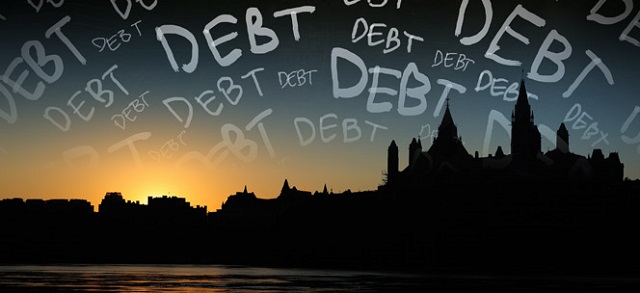Business
Red Deer District Chamber responds to Federal Budget

From the Red Deer District Chamber of Commerce
The Red Deer and District Chamber has reviewed the federal budget and despite a few bright spots,
there are no efforts to boost productivity and innovation in the country which is sorely needed for
economic growth.
Scott Robinson CEO for the Red Deer District Chamber commented, “The budget’s tagline is “Fair-
ness for every generation”; however, it is unlikely that the spending will improve conditions and continuing to increase taxes and spending will simply add to the inflation and GDP stagnation that
we are facing, as public debt reaches record highs”
Highlights include:
• Carbon tax rebates are finally being introduced for small businesses (499 or fewer employees), with approximately 600,000 firms eligible for a share of $2.5 billion. Consumers began receiving these rebates over five years ago and now small businesses will finally see the return of some of the tax dollars collected through the carbon price’s fuel charge.
• A framework for open banking will allow consumers to easily access financial data across institutions, apps, and services. Specifics will be forthcoming before the end of 2024, but this could result in business opportunities and choices for consumers.
• The targeted 3.87 million net new homes by 2031 is a step toward combatting the housing crisis experienced in Red Deer and across the country. However, our city has yet to be successful in securing funding support through the Canada Mortgage and Housing Corporation’s (CHMC) Housing Accelerator Program, despite being the 56th most populated city in the country and a vacancy rate of 0.8 percent for 2023. We are hopeful to see additional federal investment in our city and have identified recommendations to all levels of government in the Chamber’s Homelessness Task Force Report.
Areas of particular concern:
• Increasing the capital gains tax through reducing exemptions is estimated by the federal government to bring in $20 billion in additional revenue over the next five years. The Red Deer Chamber of Commerce opposes increased taxation, especially when this represents an additional tax on already taxed income. This plan will likely result in decreased investment within the country.
• Deficits of $39.8 billion are projected for 2024-2025. The government also plans to spend $54.1 billion on debt servicing, with no plans at all to decrease total public debt. This amount equates to $2 billion more than is allocated to healthcare ($52.1 billion).
• $53 billion in new spending has been identified over the next five years. This continued spending and increasing debt will negatively impact investment and will continue to increase taxes for all.
“The federal government’s 2024 budget was an opportunity to enhance economic growth and set the country on a new path, toward prosperity and investment indicated Chamber CEO Scott Robinson. “In our view the initiatives suggested by the federal government will not benefit Red Deer and district, or indeed much of the country”. The Federal Budget presented by the Government yesterday just solidify how important it is for Chambers across Canada to advocate for economic growth, innovation, and productivity policies our country needs”.
Business
Parliamentary Budget Officer forecasts bigger deficits for years to come

From the Canadian Taxpayers Federation
Author: Franco Terrazzano
“Every penny collected from the GST will now go to cover interest charges on the Trudeau government’s credit card”
The Canadian Taxpayers Federation is calling on the federal government to cut spending and balance the budget following today’s Parliamentary Budget Officer report forecasting higher deficits.
“Budget 2024 was bad, but the PBO report forecasts the Trudeau government will be running even bigger deficits,” said Franco Terrazzano, CTF Federal Director. “This PBO report should be a wake-up call for Prime Minister Justin Trudeau: get a hold of your spending or interest charges will keep ballooning.”
The PBO projects a $46-billion deficit this year. Budget 2024 projected a $40-billion deficit.
“PBO’s projected budgetary deficits are $5.3 billion higher annually, on average, over 2023-24 to 2028-29,” according to the report.
In Budget 2023, Finance Minister Chrystia Freeland said the government would find “savings of $15.4 billion over the next five years.”
However, “in Budget 2024, the government announced $61.2 billion in new spending,” according to the PBO. “Since Budget 2021, the government has announced a total of $251.6 billion in new spending measures.”
Interest charges on the debt are expected to cost taxpayers $54 billion this year, according to Budget 2024.
“Every penny collected from the GST will now go to cover interest charges on the Trudeau government’s credit card,” Terrazzano said. “Trudeau must balance the budget, cut spending and stop wasting more than $1 billion every week on interest charges.”
Automotive
Canadian interest in electric vehicles falls for second year in a row: survey

From LifeSiteNews
Canadians’ disinterest in electric vehicles comes as the Trudeau government recently mandated that all new light-duty vehicles in Canada are zero emission by 2035.
Research has revealed that Canadians are increasingly unwilling to purchase an electric vehicle (EV).
According to an April 22 survey from AutoTrader, Canadians remain skeptical of Prime Minister Justin Trudeau’s electric vehicle mandate and ongoing advertisement surrounding electric vehicles, as interest in owning one dropped for a second year in a row.
“Overall, while almost half of non-EV owners are open to buying an EV for their next vehicle, interest in EVs has declined for the second year in a row,” reported Tiffany Ding, director of insights and intelligence at AutoTrader.
In 2022, at least 68 percent of Canadians were interested in buying an electric vehicle. However, by 2023, the number declined to 56 percent. So far in 2024, there is even less interest, with only 46 percent saying they were open to purchasing one.
“AutoTrader data shows a direct correlation to gas prices and EV interest, and since gas prices have normalized from their peak in 2022, EV interest has also dropped,” a summary of the survey explained.
However, Canadians did show a slight increase of interest in hybrid vehicles, with 62 percent of those looking to purchase an electric vehicle saying they would look at a gas-electric hybrid, compared with 60 percent in 2023.
The survey also questioned Canadians regarding Trudeau’s Zero Emission Vehicle (ZEV) mandate, which requires all new light-duty vehicles in Canada are zero-emission by 2035, essentially banning the sale of new gasoline/diesel-only powered cars.
The mandate comes despite warnings that it would cause massive chaos by threatening to collapse the nation’s power grids.
“Over 75 percent of respondents are aware of the federal government’s ZEV mandate, which requires all new light-duty vehicles sold in Canada to be zero-emission by 2035,” the survey found.
However, the respondents revealed that they believe it’s “unlikely that Canada will be able to meet the federal government’s ZEV target due to the current inadequate charging infrastructure or a change in political power that could revoke or amend the ZEV mandate timeline.”
Canadians’ concerns in buying an electric vehicle include limited travel range/distance, inadequate availability of charging stations, higher purchasing costs, and concerns that they do not perform well in cold weather.
Indeed, this winter, western Canadians experienced firsthand the unreliability of Trudeau’s “renewable” energy scheme as Alberta’s power grid nearly collapsed due to a failure of wind and solar power.
Trudeau’s plan has been roundly condemned by Canadians, including Alberta Premier Danielle Smith. In 2022, Smith denounced a federal mandate that will require all new cars sold after 2035 to be “zero emission” electric (EVs) vehicles and promised that Albertans will always have the choice to buy gasoline-powered cars.
Since taking office in 2015, Trudeau has continued to push a radical environmental agenda similar to the agendas being pushed the World Economic Forum’s “Great Reset” and the United Nations’ “Sustainable Development Goals.”
The reduction and eventual elimination of the use of so-called “fossil fuels” and a transition to unreliable “green” energy has also been pushed by the World Economic Forum (WEF) – the globalist group behind the socialist “Great Reset” agenda – an organization in which Trudeau and some of his cabinet are involved.
The Trudeau government’s electric vehicle plan comes despite the fact Canada has the third largest oil reserves in the world. Electric cars cost thousands more to make and buy, are largely considered unsuitable for Canada’s climate as they offer poor range and long charging times during cold winters and have batteries that take tremendous resources to make and are difficult to recycle.
-

 Alberta2 days ago
Alberta2 days agoAlberta rejects unconstitutional cap on plastic production
-

 Business2 days ago
Business2 days agoUN plastics plans are unscientific and unrealistic
-

 Alberta2 days ago
Alberta2 days agoAlberta official reveals ‘almost all’ wildfires in province this year have been started by humans
-

 Opinion2 days ago
Opinion2 days agoThe Climate-Alarmist Movement Has A Big PR Problem On Its Hands
-

 Education2 days ago
Education2 days agoSupport a young reader through the Tim Hortons Smile Cookie campaign
-

 Automotive1 day ago
Automotive1 day agoThe EV ‘Bloodbath’ Arrives Early
-

 Brownstone Institute1 day ago
Brownstone Institute1 day agoThe Numbers Favour Our Side
-

 Fraser Institute1 day ago
Fraser Institute1 day agoFederal government’s fiscal record—one for the history books





